- Home
- Francine Mathews
Jack 1939 Page 11
Jack 1939 Read online
Page 11
“Because I want you to understand something.” Dobler drew on his cigarette. “The White Spider is not after you or your family. He’s following you,” he added quickly as Jack protested, “but I’m the one he wants.”
“Really? Then why’s he dancing with my sister?”
“I made the mistake of contacting you on the Queen Mary. That was stupid; but I had no idea the Spider was on board. Obst noticed you because I noticed you. He thinks you’re part of my plans. Hence the surveillance. Of your home—and your sister . . .”
“If it keeps up, he’ll discover two can play at his game. So what are these secret plans of yours, Willi?”
Dobler ignored the question. “Obst’s presence on the Queen Mary means that Heydrich knew about my trip to New York. He may know of my meeting with Roosevelt. That’s unfortunate.”
“Because?”
Dobler studied him quizzically. “Because I’m working against Heydrich, of course. If he’s put Obst on my tail, then my work and that of my superiors—Admiral Canaris, and the handful of people he trusts—is in danger.”
“I don’t particularly care about internal Nazi squabbles or what kind of work you do,” Jack said evenly. “I just want Obst called off.”
Dobler concentrated on his cigarette. The tip glowed red in the car’s shadows. “He’s not my dog to call.”
Jack considered this. He knew too little about Dobler’s world to sift the truth from the lies. Instead he posed another question. “Tell me something, Willi. Why would the President of the United States talk to you? I mean, don’t get me wrong, you’re a real prince of a Nazi—but you’re not exactly on Franklin’s level.”
“Neither are you, Jack.”
“I’m the son of the ambassador to England, not a Nazi spy.”
Dobler scowled at his repeated use of the word. “I joined the Party in order to work against it. It’s called cover.”
“I thought it was called treason,” Jack said blandly.
“Now that is truly scheisse.” Dobler’s dark eyes were snapping. “Adolf Hitler is exceedingly dangerous, for Germany and the rest of world. As an Oxford-educated man who believes deeply in peace and the rule of law, I have a duty to save my country from madness. That’s not treason, Jack, that’s patriotism.”
“Heydrich would disagree.”
“Do you know how many people have disappeared, simply because Heydrich ordered it? He keeps thousands of dossiers, full of names and personal information. Reasons to kill. The victims’ families learn nothing of their fate—until an urn full of ashes is delivered to the door. There is no recourse in the courts, Jack. No place to appeal. The Gestapo simply forget the people they torture and kill.”
“So why don’t you run for it?” Jack’s leg was aching again and his patience was wearing thin. “Abandon the Fatherland. Ask Roosevelt for a job.”
“Because more people will die,” Dobler said simply. “Could you live with yourself, knowing what I know? Could you just walk away?”
“The question doesn’t arise. This isn’t my war.”
“It will be,” Dobler said soberly.
“Is that what Roosevelt told you?”
“I went to him with an offer.” Dobler ground out his cigarette, eyes averted. “Canaris is secretly passing information to certain individuals in the British government.”
“Playfair,” Jack suggested.
“Playfair, certainly.”
“Even though his wife’s a Fascist?”
“Many things make excellent cover.”
Jack held Dobler’s gaze. Was he suggesting that Diana was a spy, too?
“I offered to pass the same information to Mr. Roosevelt. The private truth behind Hitler’s public lies. Whatever the Abwehr knows of his plans of attack. And there are plans.”
“Which is why the Spider should be in Poland,” Jack said thoughtfully. “Poland’s next, isn’t it?”
“Of course.”
“What did Roosevelt say to your . . . proposition?”
“He was intrigued,” Dobler said. “You Americans have no intelligence service. That kind of innocence brings tears to my eyes. You’re like Eve in the garden, before the snake appears.”
We’re heading into a hurricane with our ears plugged and our eyes closed, Jack. A horse’s ass of the Grand Old School declared that Gentlemen do not read each other’s mail . . .
He could imagine FDR weighing Willi’s sincerity against the likelihood of a Nazi trap—one that would pull him into a war the country didn’t want, and scuttle his third term. Was Willi a threat? Or a gift in the battle against Hitler?
The cab had reached the southern end of Hyde Park and eased left into Regent Street; Jack could just see the lights of Prince’s Gate.
“Mr. Roosevelt thought it best if I passed my intelligence through friends, not government channels,” Dobler said.
Of course. I can’t trust the State department with this.
“Have you got any friends, Willi?” Jack wondered. “—Besides Playfair and that guy at work who watches your every move?”
“Friendships are born in surprising places.”
“Like back alleys,” he suggested. “Or foxholes.”
The cab pulled up before his door.
“Will you work with me, Jack?” Dobler asked quietly.
He weighed the German for a long moment. “Give me a reason to, Willi.”
EIGHTEEN. TRAFFIC
“LOOKING FOR SOMEBODY?”
Jack paused in the doorway of the embassy’s telegraph room. There was only one code clerk there at 8:45 on Saturday morning: a slight man with hunched shoulders and hair as glossy as a mink’s. “I’d like to send a transatlantic cable.”
“Clear text or coded?”
“Coded.”
“Who do you want to reach?”
“A man named Sam Schwartz.”
“The President’s bodyguard?”
Jack handed him the sheet of paper he’d carefully printed.
PLEASE VERIFY DESIRED RELATIONS WITH W.D. STOP CHECK BACKGROUND ONE HANS OBST ALSO SR. MARY JOSEPH LITTLE SISTERS OF CLEMENCY ROME STOP BEST JACK.
“Thanks,” he said from the doorway, but the clerk was already tapping the keys of his machine, and didn’t answer.
* * *
SISTER MARY JOSEPH of the Little Sisters of Clemency, Dobler had murmured last night as Jack got out of the cab.
“Sister Mary Who?”
“Joseph. She runs a charity network in Rome. You’re attending the Pope’s coronation, I believe?”
“Next week.”
“She’ll be there. Ask where she gets her donations—and where they’re going. A bit of research for your senior thesis.”
It was Willi’s first tidbit of intelligence. Jack would have liked to ask some questions, but he was standing in the street, completely exposed. Dobler had chosen the moment for that reason. He’d thrown Jack a teaser, like a girl shimmying, her skirt high on her leg as she danced the big apple.
Jack pushed the German out of his mind now and knocked on the door of his father’s office.
“What are you doing here on Saturday?” Joe Kennedy asked. “You should be keeping an eye on Kick. She spends too much time with Billy Hartington.”
“He’s a nice fella, Dad. Kick could do worse.”
“She’s risking her immortal soul.”
Jack’s eyebrows shot up. “Sounds like Mother talking.”
“By trunk call, every day. From Egypt.” His father looked strained and mulish. Rose usually had that effect. “You know what she’s costing me?”
“I didn’t know Egypt had telephones.” He leaned casually against his father’s desk “Need any help around here?”
“You could drop my weekly
report at the code clerk’s office.” He tossed some paper across his polished desk. “Not that Franklin reads it.”
“I’m sure he does,” Jack said absently.
“He never takes my advice.” J.P.’s voice was rough with resentment. “In my last cable, I told him Chamberlain’s stock was on the rise, and we needed to keep our distance from the Jewish lobby agitating about Munich. If Chamberlain says Hitler’s satisfied with the Sudetenland, who are we to argue? It’s not like we’ve talked to the Führer. Ever since Franklin recalled Ambassador Wilson to protest Kristallnacht, our relations with the Germans have gone straight downhill.”
“These cables,” Jack said. “Your secretary just hands them to the code clerk, whichever one happens to be there, and he sends them?”
“Sure,” his father said.
“And you don’t mind him reading your reports? Everything private about the British government—you’ve written for Roosevelt’s eyes alone?”
“I’m not sure those guys can read,” Joe said mildly. “Besides, I don’t have any choice. I can’t work a Morse key, much less an encoding machine.”
“What do you know about the clerks?”
“They’re vetted by State. That’s good enough for me.”
What had Roosevelt said? Too many of my private conversations are finding their way into Hitler’s office.
Jack stared at his father’s report. He couldn’t send Willi Dobler’s intelligence through State department clerks. He might get Willi killed.
“Some things you just have to take on faith, son,” his father said. “Now, could you run that report downstairs? I’d like Franklin to see it before bedtime.”
* * *
THE LONDON SOCIAL SEASON didn’t truly begin until Easter, and most of the West End stage was still dark; but that night Jack dined with Kick at the Mitfords’ and then took in a musical called Magyar Melody at His Majesty’s Theatre. It was a sappy play about an Englishman in love with a wild Hungarian maiden, a romanticized vision of Eastern Europe that firmly ignored Hitler’s plans for it; the audience applauded when love triumphed, but Jack left feeling vaguely unsettled, as though he’d been treated to a child’s bedtime story. He glanced at every stranger’s face as they left the theater, looking for a man with the build of a halfback and a scar bisecting his lip. Killers like the Spider didn’t just give up.
“Coming to the 400, Jack?” Kick asked.
“I don’t feel like it tonight. How about we get up a dance back at the house? I brought some new records from New York. Dad’ll be out.”
“He always is.” Kick frowned at him in perplexity, and seemed about to ask why he was so reluctant to drink in their favorite watering hole, but Debo Mitford interrupted. “Oh, Jack—tell me you’ve got that new tune by the Ink Spots!”
“‘If I Didn’t Care’?” he suggested. “You bet. Sitting right there in the stack, on my bedroom dresser.”
“It’s supposed to be divine, but nobody in London has heard it yet.”
He raised his eyebrow at Kick, and she shrugged a little, reconciled. It took three cabs to get all of them back to Prince’s Gate.
* * *
A GREAT DEAL OF GIN WAS DRUNK and the armchairs of Rose’s formal salon pulled back against the wall to make room for a game of touch football, but since only Jack and Kick fully understood the rules, the others danced the big apple in a ring around them. A girl named Sally Norton, rangy as a Thoroughbred and in love, Jack thought, with Billy Hartington, raced hilariously across Regent Street at two o’clock in the morning and plunged into Hyde Park’s frigid Serpentine.
It was Jack, not Billy, who dove in to save her.
He didn’t mind the shock of the water or the mess it made of his clothes. Sally and her games had kept Kick occupied for one more night, safe from the White Spider.
NINETEEN. PRAYER
SUNDAY MORNING. The Spider sat in the rear of the Brompton Oratory unmoved by the vastness of the dome, the way the light cascaded from its clerestory windows even in the depths of March. The exalted trebles of the choir reached his ears without penetrating them. He could command stillness from his body—it was his tool to use and he had mastered it long ago—but his pulse was throbbing chaotically. His eyes were fixed on a girl some distance in front of him, near the transept. She was kneeling there in the midst of her family, gloved hands folded like a dove’s wings. Her head was bowed. A lace veil covered her tumult of auburn hair. He could almost feel her breast rise and fall with each breath she drew, each prayer she murmured. So pure. So impossibly white. He wanted to take her there and cut his mark into her flesh—make her his own. But she was denied him. He closed his eyes and bit down on his lip until he tasted blood.
The Latin mass eddied around him. He did not move, though his rootedness in the pew was unusual, the mark of the unbeliever. It was only when the final benediction came and the congregation rose that he abruptly thrust his blunt body out into the side aisle, head down. The priest and his acolytes passed, crucifix high. He followed.
From a doorway across the Brompton Road he watched them leave the oratory. She was laughing as she slipped into the chauffeured car. Her brother did not even look in his direction. The Spider felt their indifference like a slap in the face. What fools, to slap him. His hand tightened lovingly on his knife.
TWENTY. COLONEL GUBBINS
EVERYONE AT PRINCE’S GATE ate dinner in their pajamas Sunday night—a Kennedy tradition when Rose was away—and the sight of Kick with her hair tied up in curl-papers, casually filing her nails, was a relief. Jack hadn’t realized how tense he’d become, waiting for the Spider’s next move.
He read about it after the fact, on Monday morning. In a small headline on a back page of the London Times.
East End Girl Murdered.
Her name was Sadie Mullins and she’d been found in an alley near the docks. A child, really; only fifteen. She’d been knifed in the heart, and a crude mark cut into her breast. It looked, the reporter said, like a carnival wheel—or a swastika. . . .
Jack studied the newsprint, remembering something Willi had said. He likes to cut his mark into his victim’s chest—a crouching spider.
He tore out the article and stuffed it in his pocket.
* * *
HE ROAMED HIS FATHER’S OFFICE after the ten o’clock staff meeting like a restless cat, leafing through books and a bundle of week-old newspapers from the States. He was waiting for an answer to the cable he’d sent Schwartz.
“Mr. Kennedy?”
He turned, dropping a stack of Time magazines, and saw the code clerk with the sleek black hair. “Yes?”
“Cable for you.”
“Thanks.” He took it eagerly from the man’s hands.
The clerk lingered, watching him. “The message is a little odd, I have to say.”
Jack glanced at him. So J.P. was wrong—the code clerks could read. And pass judgment on the cables they encrypted.
“What’s your name?” he asked the man suddenly.
The cool gray eyes held his own. “Tyler Gatewood Kent. Princeton ’32.”
“Good man. I spent some time at Old Nassau. Before I transferred to Harvard.”
“I know,” Kent said. His lips quirked in something that was almost a sneer.
Jack flushed. He didn’t broadcast the details of his Mystery Disease, so any number of people thought he’d flunked out of Princeton. Tyler Kent must be one of them. The clerk wanted to unsettle him. Suggest that he’d read Jack’s dossier behind his back. Have some fun with the ambassador’s son. J.P. was not terribly popular with career State department people—and a few took it out on his kids.
Jack grasped the edge of the office door as though he were about to close it. He wanted to read the cable and he had no interest in an audience.
“Thanks again,” he said.
Kent saluted sardonically and drifted away.
Jack shut the door and threw himself into one of his dad’s easy chairs.
IT IS RARE TO HAVE SNOW IN MARCH STOP BUT NOT ENTIRELY UNKNOWN IN LONDON STOP SCHWARTZ
What?
He read the infuriating phrases through a second time, and then a third. Nothing about Willi Dobler or Roosevelt’s desire for intelligence; nothing about the Little Sisters of Clemency. Was this Schwartz’s attempt at a joke?
* * *
“WHERE ARE YOUR NEW CLOTHES?” his father demanded at lunch. “You’re still a mess. And that shiner’s taking its own sweet time to heal.”
“I have a fitting this afternoon.”
He could care less about his face or the state of his wardrobe. He was still annoyed about Schwartz’s cable. Didn’t the guy take German agents seriously? Maybe knives in the dark were all in a day’s work for the Secret Service.
His father looked him up and down. “Please, Jack. We leave for Paris in a week. Get your ass down to Poole’s right now.”
* * *
SAVILE ROW WAS A QUIET STREET lined with what looked like gentlemen’s clubs. The tailors who ruled it didn’t need to advertise; their clothes spoke for them. There was Gieves, whose original founders had dressed Victoria’s court and military men for generations; Anderson & Sheppard, who specialized in Hollywood movie stars; Kilgour, French & Stanbury, who enjoyed a Mayfair patronage; and Henry Poole & Company. The latter was known for serving the diplomatic corps.
Benton, who greeted clients as they stepped into Poole’s foyer, remembered Jack from his previous visit. He took his coat and hat without commenting on their New York labels and led him to a leather chair by a gas fire.
“May I offer you coffee, sir? Or perhaps a sherry?”
“What I’d really like is a fitting,” Jack replied. “I’ve got an appointment for two o’clock, but I have to leave town Thursday morning and I’m worried my clothes won’t be done.”
“I’ll inform Mr. Rathbone,” Benton murmured.
Jack waited. He assessed his reflection in one of the tall mirrors. His cheeks were still too hollow and his skin too white. Except where it was bruised and green. Mother would not be pleased when she saw him in Rome. But he thought the DOCA was working. His nausea and diarrhea were diminishing. He’d written to Mayo to let George Taylor know.

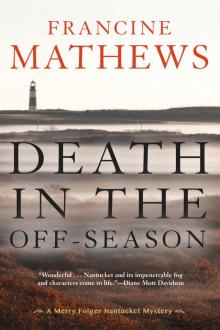 Death in the Off-Season
Death in the Off-Season Death in Rough Water
Death in Rough Water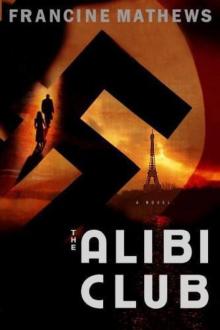 The Alibi Club
The Alibi Club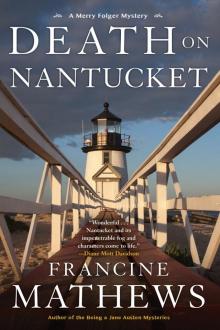 Death of a Wharf Rat
Death of a Wharf Rat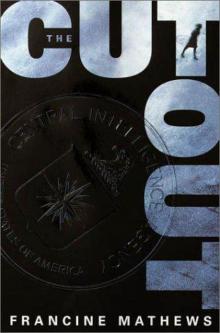 The Cutout
The Cutout The Secret Agent
The Secret Agent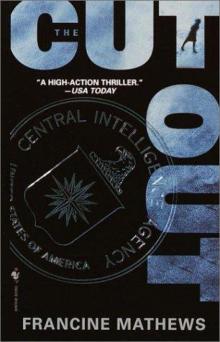 The Cutout cc-1
The Cutout cc-1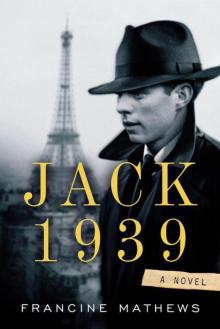 Jack 1939
Jack 1939 Death in a Cold Hard Light
Death in a Cold Hard Light Blown
Blown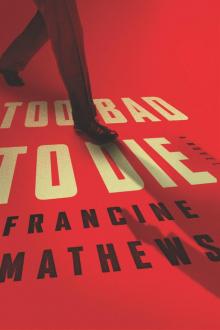 Too Bad to Die
Too Bad to Die